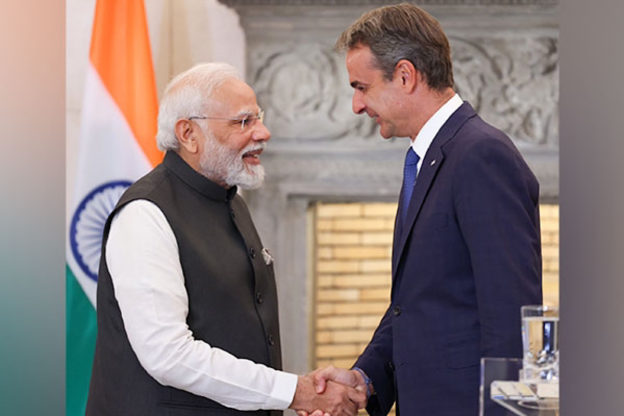India and Greece have now become “strategic partners,” announced Prime Minister of India Shri Narendra Modi and Prime Minister of Greece H.E. Kyriakos Mitsotakis. But what are the reasons for the friendship and strategic synergy between India and Greece?
According to Aristotle in his Nicomachean Ethics, humans are by nature political animals, and politics is guided by history. The history of civilizations is that which determines the manner in which people and nations deal with each other after their transformation into nation-states in the modern world.
Foundational Identities
Indic and Hellenic identities became the foundational cores of the modern nation-states of India and Greece respectively, and their foreign policies were structured over the years substantially congruent to these cores.
American political scientist Samuel P. Huntington argues in his book The Clash of Civilizations and the Remaking of World Order that, after the Cold War, conflicts over cultural and religious identity will dominate global politics.
It is indeed perceptible in different conflicts around the world, says Huntington, that the chasms of the past have transformed into major conflicts. India and Greece have historically been on the same side in a type of “clash of civilizations” against common foes.
While both fought against Turkish aggressors, they even fought against China. The Greeks fought against China in the “War of Heavenly Horses,” and Indians have likewise fought several times against China.
Shared History
India and Greece were pioneers in the field of several disciplines and manifested development of urbanized societies very early. They were not working in isolation, however. Rather, a bridge of friendship and mutual learning developed by the time Indo-Greek kingdoms were established in India.
Indo-Greeks were receptive and appreciative of Indic civilization’s culture and Hellenized Hinduism and Buddhism practices were later adopted by migrant nomads, such as those of the Yuezhi, Huns, and Uyghurs. Greek Orthodoxy and Puranic Hinduism also have several similarities, manifested through the organization of their religious sites and liturgies.
Just consider the icons of Skandamata and Kalki in Puranic Hinduism and Theotokos and St. George in Greek Orthodoxy. These indeed look substantially similar.
Common Challenges in the India and Greece Partnership
In the Turan belt, a historical region in Central Asia, the Turks moved to historic Greek and Indian homelands in large numbers as invaders over the years. There was the establishment of Seljuk and the Ottoman states in Anatolia, Sultanate of Delhi, and later, the Turco-Mongol Mughal Empire in India.
Christian Greeks and Hindu Indians were increasingly discriminated against within their own historic homelands through instruments of discriminatory taxation, military suppression, and religious fundamentalism.
The Turks used Greeks and Indians to subjugate their own countries. During the time of Caliph Sultan Suleiman-ul-Qanuni, the Ottoman Grand Vizier Pargali Ibrahim Pasha, who was born a Greek Christian in the seaside town of Parga, Epirus, played an important role in extending Turkish power in Europe and Egypt.
On the other hand, in India, Malik Kafur, the general of Turkic Sultan Alauddin Khilji of Delhi, was born an Indian Hindu in Gujarat and played an important role in conquering major parts of India for his Sultan. Over the years, substantial parts of Indian and Greek lands became Turkified.
The modern nation-states of Turkey and Pakistan are an outcome of a long process of Turkish ideological and military aggression against the ancient civilizations of India and Greece.
Even to this day, Turkey and Pakistan collaborate to broadcast shows depicting the Turkish version of history to South Asian audiences. This spreads hate against the Byzantium and Greece. It is an important part of Turkish soft power.
Furthermore, Turkey has provided Pakistan with four warships through the MILGEM project, and Pakistan has bought the first batch of Bayraktar Akinci combat drones from Turkey. Together, they have fought with Azerbaijan as part of the “three brothers” alliance against Christian Armenians in the Second Nagorno-Karabakh War.
India and Greece: Strategic Partners Working Together
In the India-Greece joint statement issued on August 25, 2023 following the meeting of Prime Minister of India Shri Narendra Modi with Prime Minister of Greece H.E. Kyriakos Mitsotakis, the nations of India and Greece shared their vision of a free, open, and rules-based Mediterranean Sea and Indo-Pacific region.
This is in accordance with the law of the sea, in particular the provisions of the UNCLOS, and with full respect for the sovereignty, territorial integrity, and freedom of navigation to the benefit of international peace, stability, and security.
Such a stance can be interpreted as a message against China, a nation that is seen as a bully in the Indo-Pacific region. An UNCLOS tribunal in the past had called out China for flagrant violation of international law in the China Sea.
Modi and Mitsotakis also strongly condemned terrorism in all its forms and manifestations, whenever, wherever, and by whom-so-ever committed. Furthermore, they jointly criticized the use of terrorist proxies for cross-border terrorism. This can be interpreted as a message against Turkey and Pakistan.
As per Dr. Christina Lin, Turkey is supporting other countries’ designated terrorist groups. These include the Muslim Brotherhood, Hamas, ETIM/TIP, Al Nusra, and other Al Qaeda affiliates. Pakistan is a known state sponsor of terrorism as well. Osama Bin Ladin was ultimately found in Pakistan.
However, Greece and India have also made promises to each other to work on much more. The two countries intend to deepen their cooperation in several other fields in order to further their national interests. They have become strategic partners, but now they also need to come together with like-minded countries, such as Armenia, to protect their national interests in a more efficient way.
Hopefully, India and Greece will work together to strengthen their national interests, preserve ancient sites associated with Indo-Greek history, and promote people-to people-diplomacy at a faster pace so as to continue to strengthen the India-Greece friendship.
https://greekreporter.com/2023/09/03/strategic-partners-greece-india/





